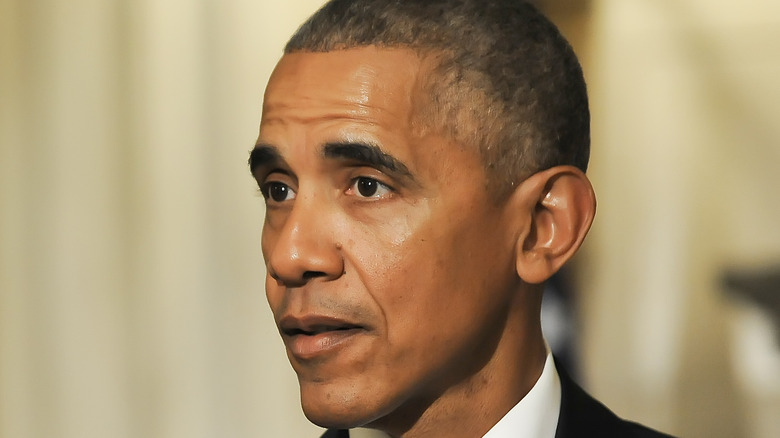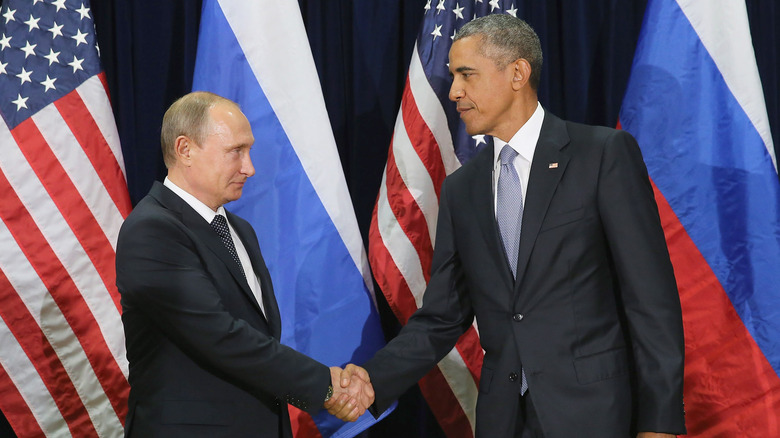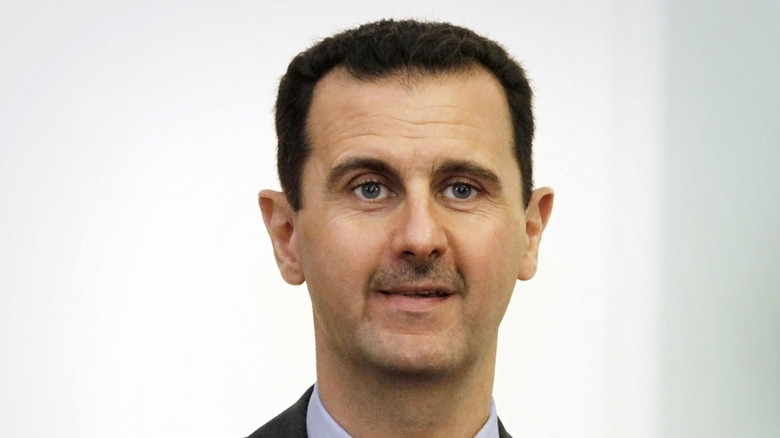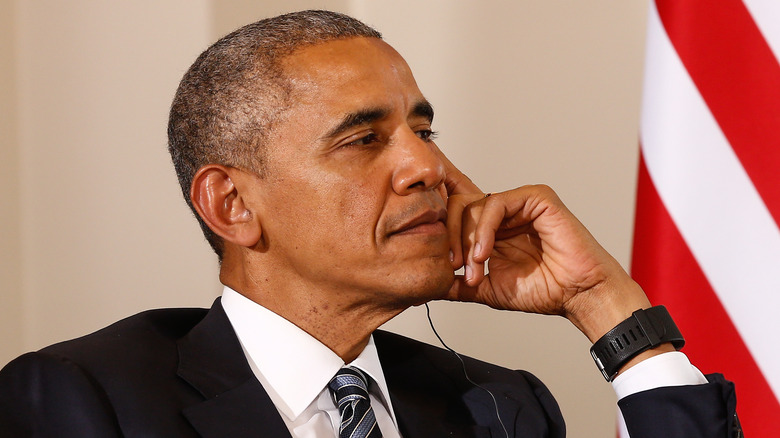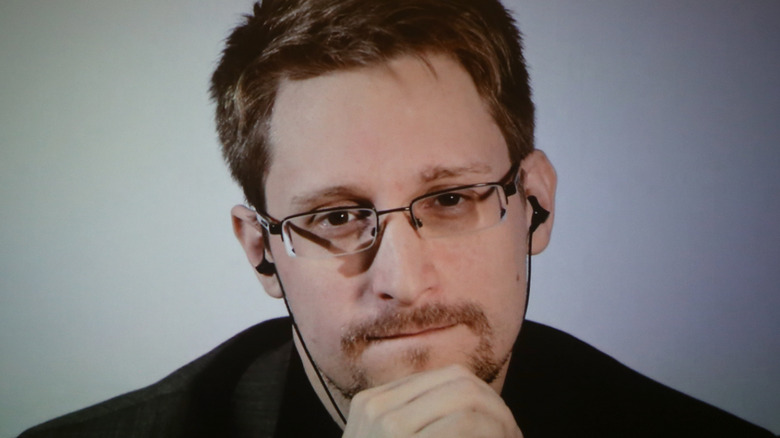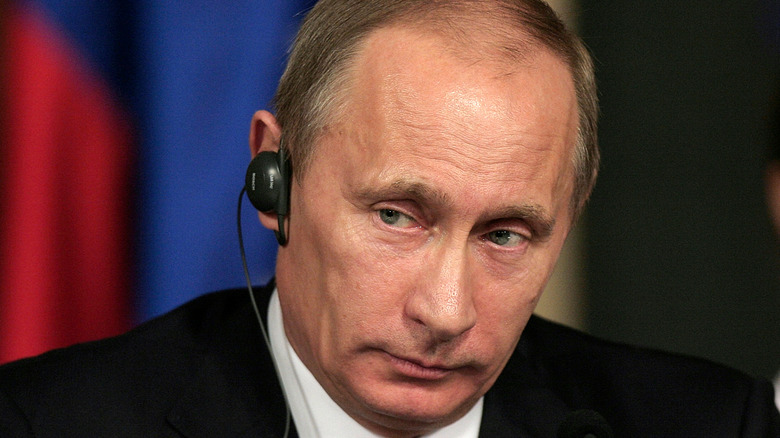Inside Vladimir Putin And Barack Obama's Complicated Relationship
In 2009, when Barack Obama became the 44th American President, U.S.-Russian relations were tense (via Britannica). Obama's predecessor, George W. Bush, and his administration, tried their best to smooth things over with the rival world power. Despite their best efforts, though, sticking points remained between the two countries, including Russia's controversial war in the former Soviet republic of Georgia, among other differences. During George W. Bush's eight years in office, Vladimir Putin was President of Russia, but in 2008, Dmitry Medvedev was hand-picked by Putin to take over the role (per Britannica).
By the time Obama was elected for a second term, though, Medvedev had given his presidential powers back to Putin and returned to his role as prime minister, changing the geo-political dynamic between the two countries once more. The new Obama administration did see an opportunity to finally make some headway while Medvedev was still in office. But try as they might, those efforts were largely unsuccessful, complicating American relations with Russia all throughout Obama's two terms. That was particularly true in 2012, when Vladimir Putin returned to the presidency.
Obama hoped for a 'reset'
Like Obama, Medvedev, who was Russia's president in Obama's first term, was from a younger generation that was willing to leave traditional Cold War policies behind, according to Brookings. Or so the Obama administration had hoped, codifying this fresh beginning between the two countries in the New START treaty. In the agreement, America and Russia would cooperate as never before on a number of policy points and on a long list of international issues. Although somewhat agreeable at first, the Russians saw the pact differently (per Brookings).
Where Russia and America most diverged was in a legally binding Euro-Atlantic super-treaty. NATO countries, of which Russia was not a member, opposed such an agreement, particularly in the wake of the Georgian war, and though by that point, Russia had joined the World Trade Organization (WTO), according Brookings. For their part, the Obama Administration backed off plans to expand NATO into former Soviet republics, pleasing the Russians. By 2011, though, it was announced that Putin would return to the Kremlin. At that point, everything changed.
Obama and Putin disagreed over Syria
Shortly after Putin returned to the Russian presidency, relegating Medvedev back to parliament, the population of a number of Arab countries rose up against their authoritarian leaders in what would become known as the Arab Spring (via Britannica). Included in the Arab countries experiencing unrest at that time were Syria, under President Bashar al-Assad (pictured above), and Libya, under Muammar al-Qaddafi, who was killed in an uprising in 2011 (per Britannica). The United States and the Obama Administration supported the overthrow of these autocratic governments, while Russia, again under Putin, felt differently.
At that point, Russia, through its position in the UN Security Council, called for absolute state sovereignty in these uprisings, while the U.S., as well as many other UN nations and members of NATO, thought these international organizations should intervene to support the popular uprisings whenever possible. Russia also had a number of political and diplomatic ties to both Syria and Libya. As a result, the Kremlin refused to move against Assad, and Putin government also opposed most actions taken by the global community against Libya, per Brookings.
Obama skipped the Sochi Olympics
With U.S.-Russian relations at an ebb, President Obama chose not to attend the 2014 Winter Olympics in Sochi, China, considered by many to be a snub of President Putin. Supporting this theory, Obama not only announced that he would not be attending as president, nor would any members of his administration. He would instead send a number of openly gay athletes, such as legendary tennis player and LGBTQ+ advocate Billie Jean King, as well as hockey player Caitlin Cahow, per ABC News. Although symbolic, members of the Olympic delegation such as these were in direct response to several instances in which Putin supported Russian laws against the LGBTQ+ community, per BBC.
As USA Today reports, the White House said in a statement of Obama's decision, "President Obama is extremely proud of our U.S. athletes and looks forward to cheering them on from Washington. He knows they will showcase to the world the best of America — diversity, determination and teamwork." Also at that time, Andre Banks, executive director of the international LGBTQ+ advocacy right group All Out, said, "It's hard to look at this delegation without seeing it as a criticism of Putin's anti-gay laws" (via USA Today).
Putin and Obama differed on Snowden
Another contentious issue between President Obama and President Putin involved Edward Snowden (pictured above). Snowden was an IT expert working under contract for the National Security Agency when he allegedly leaked highly classified documents pertaining to surveillance of the American people by the Federal Government, per NPR. When Russia granted asylum for Snowden rather than returning Snowden to the U.S. to stand trial for espionage, it further strained relations between the two countries, as The Washington Post reports.
On the topic of NSA reform, Obama said, "If any individual who objects to government policy can take it in their own hands to publicly disclose classified information, then we will never be able to keep our people safe, or conduct foreign policy" (per The Guardian). For his part, Putin stopped short of calling Snowden a traitor. "He did not betray the interests of his country, nor did he transfer any information to any other country that would damage his own people," he said (via Reuters). As of 2020, Snowden remained in Russia and announced plans to seek dual-Russian-American citizenship, also via The Guardian. He was granted permanent residency rights in November 2020, said Reuters.
The U.S. passed laws over Russian human rights violations
In response to Russia's long list of human rights violations, the Obama Administration passed laws specifically targeting Putin. Also around this same time, the Obama administration canceled a summit between the two countries with the following statement: "Given our lack of progress on issues such as missile defense and arms control, trade and commercial relations, global security issues, and human rights and civil society in the last 12 months, we have informed the Russian government that we believe it would be more constructive to postpone the summit until we have more results from our shared agenda" (via ABC News).
In addition, the Obama Administration banned Russian officials from traveling to the U.S. In response, Russia stopped the adoption of Russian children by American parents. As the Obama administration wound down, the situation hardly improved, as Putin, himself, summed it up: "President Obama hasn't been elected by the American people in order to be pleasant to Russia ... And your humble servant hasn't been elected by the people of Russia to be pleasant to someone, either," offering further proof that no love was lost between the two leaders.
